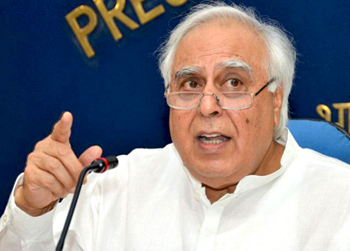New Delhi, May 16: The Supreme Court on Tuesday continued its hearing on a bunch of petitions relating to the practice of triple talaq, with the All India Muslim Personal Board presenting its case in the court.

“Triple talaq is going on since 1,400 years, how can you say it is unconstitutional? It's a matter of faith,” Sibal told the apex court bench.
Furthering his argument, Sibal said, “There is no question of constitutional morality and equity in matters of faith”.
Also making a reference to the Ayodhya temple issue, Sibal pointed out that if Hindus' faith about Lord Rama is not arguable, Muslims' faith in triple talaq should also not be questioned
"If Hindus faith about Rama's birth at Ayodhya can't be questioned, then triple talaq, a matter of faith for Muslims shouldn't be (questioned too)," said Sibal
He also referred to the fact that the source of triple talaq can be found in Hadith and that it came into being after the time of Prophet Muhammad.
Sibal further remarked that the court should not be hearing the case in the first place. The advocate said so when Justice Rohinton Fali Nariman, one of the five judges constituting the bench asked if they should not hear the matter at all, following his non-interference in faith reasoning.
The apex court, however, asked the AIMPLB to state its opinion on the position of e-talaq in Islam, given through Whatsapp messages.
Earlier, The Centre on Monday had informed the Supreme Court that it would bring a law to regulate marriage and divorce among Muslims if the court held triple talaq invalid and unconstitutional.
Attorney General Mukul Rohatgi, India’s top law officer, made this submission after a five-judge constitution bench asked him about the remedies for Muslim men if triple talaq was struck down.
The multi-faith bench comprising Chief Justice of India JS Khehar and Justices Kurian Joseph, Rohinton Nariman, Uday Lalit and Abdul Nazeer is examining the legality of triple talaq after a clutch of petitions for a ban on the practice was filed.
The AG said triple talaq was not fundamental to Muslim personal law, and as the guardian of fundamental rights, the court should protect the rights of half of the Muslim population, which suffers discrimination.
The CJI told the AG, “We (court) are guardians of fundamental rights as well as minority rights. We agree with you that if triple talaq is arbitrary, extra-judicial, it must go. But we are not here to tinker with religion, tenets of religion and religious practices. Tenets of religion can never be tested by courts. What we may ultimately decide will impact a large section of the population.”
The Narendra Modi government at the Centre has been pushing for a ban on the contentious practice on grounds of gender equality and justice. The push also looks to win support from Muslim women and chip away at an important bloc of voters that has viewed Modi with suspicion. The All India Muslim Personal Law Board has promised reforms in personal law but opposed a blanket ban on the practice.






Comments
Add new comment